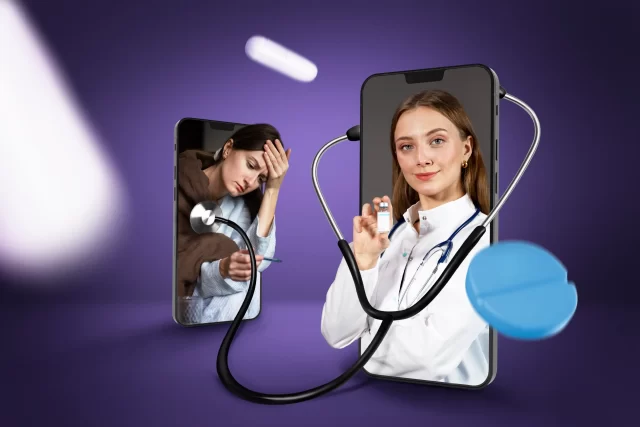As we step into 2024, the healthcare industry is experiencing a surge of transformative changes fueled by cutting-edge technologies. These innovations are enhancing patient care, streamlining operations, and improving overall efficiency. At Bot Medics Care, we are dedicated to serving the healthcare industry as the ultimate one-stop solution for outsourcing services. Staying informed about these advancements is crucial for anyone involved in healthcare. Here, we explore the top health tech innovations revolutionizing healthcare in 2024.
Artificial Intelligence in Diagnostics Health Tech
Artificial Intelligence (AI) is at the forefront of healthcare innovations. AI algorithms are now capable of analyzing medical data with incredible accuracy and speed, surpassing traditional diagnostic methods. For instance, AI-powered imaging systems can detect anomalies in radiology scans with high precision, aiding early diagnosis and treatment planning. These systems are particularly effective in identifying conditions such as cancers, cardiovascular diseases, and neurological disorders.
AI is also being integrated into pathology to assist with the analysis of tissue samples. By automating routine tasks, AI allows pathologists to focus on more complex cases, ultimately improving diagnostic accuracy and patient outcomes.

Telemedicine and Telehealth
Telemedicine has become an indispensable part of modern healthcare, especially in the wake of the COVID-19 pandemic. It offers patients the convenience of consulting healthcare professionals remotely, reducing the need for in-person visits. Telehealth platforms have evolved to include advanced features such as remote patient monitoring, virtual reality for therapy, and AI-driven chatbots that provide instant assistance and triage.
These advancements are particularly beneficial for managing chronic conditions, mental health services, and follow-up consultations. Patients in remote or underserved areas can now access quality healthcare without the need to travel long distances, thus bridging the gap in healthcare accessibility.
Wearable Health Devices Health Tech
Wearable technology continues to advance, providing real-time health monitoring and data collection. Devices like smartwatches and fitness trackers now offer sophisticated features such as electrocardiogram (ECG) monitoring, blood oxygen level tracking, and stress measurement. These devices are instrumental in preventive healthcare, as they can alert users to potential health issues before they become serious.
Healthcare providers can also use data from wearables to monitor patients with chronic conditions more effectively. For example, continuous glucose monitors help diabetic patients manage their condition by providing real-time glucose readings and trends, allowing for better control and fewer complications.
Blockchain for Health Records Health Tech
Blockchain technology is making significant inroads into healthcare, primarily in the management of health records. Blockchain provides a secure, immutable ledger for storing patient data, ensuring that records are tamper-proof and easily accessible by authorized personnel. This technology enhances data privacy and security, which are critical in healthcare.
Blockchain also facilitates the seamless sharing of medical records across different healthcare providers, improving care coordination and reducing administrative burdens. Patients have more control over their health data, allowing them to grant access to specific providers as needed.
Personalized Medicine Health Tech
Personalized medicine tailors treatments based on an individual’s genetic profile, lifestyle, and environmental factors. Advances in genomics and biotechnology enable healthcare providers to develop customized treatment plans that are more effective and have fewer side effects. This approach is particularly beneficial in treating complex diseases such as cancer, where traditional therapies may not be as effective.
By analyzing genetic information, healthcare providers can identify the most suitable medications and dosages for each patient, reducing the trial-and-error approach often seen in traditional medicine. Personalized medicine is paving the way for more precise and effective treatments.
Robotic Surgery
Robotic surgery is another groundbreaking innovation in healthcare. Surgical robots provide surgeons with enhanced precision, flexibility, and control during procedures. These robots can perform minimally invasive surgeries with smaller incisions, reducing recovery times and minimizing complications.
For example, robotic-assisted surgeries are commonly used in procedures such as prostatectomies, hysterectomies, and cardiac valve repair. The enhanced precision of robotic systems allows for better outcomes and quicker patient recovery.
3D Printing in Healthcare
3D printing technology is revolutionizing the production of medical devices, prosthetics, and even human tissue. Customizable 3D-printed prosthetics provide better fit and function for patients, while 3D-printed surgical models allow surgeons to plan and practice complex procedures before operating on patients.
In regenerative medicine, researchers are exploring the use of 3D printing to create bio-printed organs and tissues. While still in experimental stages, this technology holds the promise of addressing the shortage of donor organs in the future.
The healthcare industry is on the brink of a technological revolution, with innovations such as AI, telemedicine, wearable devices, blockchain, personalized medicine, robotic surgery, and 3D printing transforming patient care and healthcare operations. At Bot Medics Care, we are committed to keeping you informed about these advancements and providing the best outsourcing solutions to support your healthcare needs
